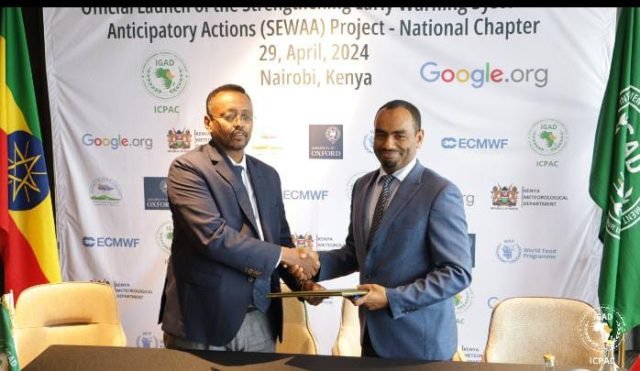The IGAD Climate Prediction and Applications Centre (ICPAC) has enhanced the regional climate body’s ability to provide early warning and preparedness information in effect bolstering disaster preparedness and response capabilities.
Through the support of the United Nations World Food Programme (WFP) program for the implementation of a pioneering project titled “Strengthening Early Warning Systems for Anticipatory Actions.” This initiative, aimed at leveraging machine learning to enhance early warning information systems, marks a collaborative effort involving leading weather and climate research institutions, a university, and a humanitarian organization.
The funding provided by WFP will benefit the Kenya Meteorological Department and Ethiopian Meteorological Institute, in the enhancement of the two country’s national and sub-national forecasts.
“By transforming the quality of early warning information available to communities in disaster-prone regions,” said a statement by ICPAC and adds, “the project endeavors to facilitate proactive responses to critical alerts.”

ICPAC Director Dr. Guleid Artan not the owing to the exacerbation of natural hazard-induced disasters due to climate change, “the importance of timely and accurate early warning systems cannot be overstated,” he said and added that, “Supported by Google.org, this project endeavors to address this pressing need by harnessing cutting-edge technology and innovative approaches through the utilization of artificial intelligence, machine learning, and data analytics, the project aims to enhance the accuracy and timeliness of disaster alerts, empowering communities to take proactive measures to safeguard lives and livelihoods.”
Dr. Artan expressed enthusiasm that the use of a combination of expertise in weather forecasting, disaster risk reduction, and technological capabilities, “With the involvement of partners such as Google, the University of Oxford, the Ethiopian Meteorological Institute, the Kenya Meteorological Department, and the World Food Programme, the project aspires to revolutionize early warning systems in the IGAD region and enable communities to prepare and act pre-emptively against impending hazards”.
The project will begin with a pilot of implementations in Ethiopia and Kenya, with the lessons learned informing the scaling-up of initiatives across the region. “Ultimately, the goal is to ensure that vulnerable communities throughout the IGAD region have access to life-saving early warning information and that they can take timely action in the face of impending disasters.”







